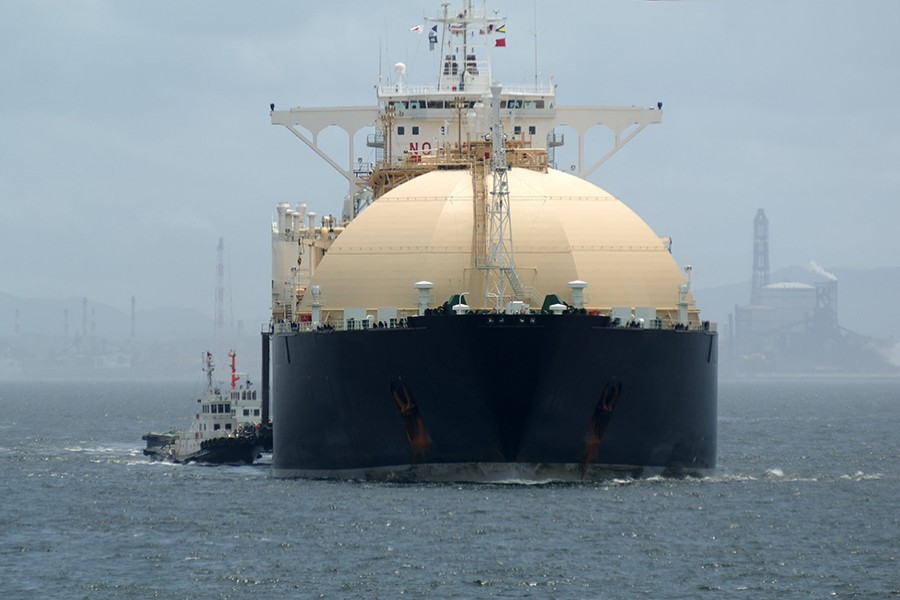PMO body finds LNG cheaper, favours piped gas supplies
Decision clashes with ministry's pro-LPG stance

Published :
Updated :

Re-gasified liquefied natural gas, LNG, is cheaper and safer than liquefied petroleum gas, LPG, for cooking in cities, a committee has found.
The government should import required quantity of LNG, build sufficient terminals coping with the rising demand for natural gas to supply re-gasified LNG in houses through pipelines.
A high-powered committee of the Prime Minister's Office, or PMO, has recently concluded this.
A subsequent meeting, chaired by Prime Minister's advisor on energy affairs Dr Tawfiq-e-Elahi Chowdhury, also decided to provide new piped gas connections in areas having pipeline networks considering the LNG import and availability.
The decision of the meeting and the findings of the committee report clash with the current standpoint of the energy ministry.
The ministry favours LPG instead of piped gas connections for urban domestic consumers.
Rights groups and energy experts also supported the findings of the committee report and viewed re-gasified LNG supply in households in areas having the pipe networks.
The committee, headed by the Bangladesh Energy Regulatory Commission, or BERC member Mizanur Rahman, found that the price of LPG is 65 per cent higher than that of LNG for cooking.
One cubic metre of LNG is priced at Tk 35.40, while price of one cubic meter of LPG is Tk 58.50, it revealed taking into the consideration of average international price of LNG and LPG in 2018.
During 2018, average LNG price was US$11.60 per million British thermal unit, or mmBtu, the highest over the past several years.
Average LPG price was US$19.2 per mmBtu in 2018, the committee found.
The six-member committee recommended that an integrated gas transmission and distribution network must be developed efficiently to meet the soaring demand.
It also recommended providing meters with the new piped connections for re-gasified LNG supplies to households.
A number of Asian countries, including the neighbouring India, Singapore and Japan, are encouraging piped natural gas connections in cities, the committee said.
Energy advisor of the Consumers Association of Bangladesh, CAB, Professor Shamsul Alam demanded resuming piped natural gas connections to new consumers in cities having pipeline networks.
He also suggested expanding the LPG supply networks in areas having no gas pipelines. The government should provide subsidies to LPG users in remote areas, Mr Alam said.
The CAB adviser was critical of the energy ministry's stance on continuing piped natural gas connections in households.
It is tantamount to provide advantage to the LPG business, he alleged.
Mr Alam was also critical of the recent abrupt hike in retail prices of LPG, which shot up by 20 per cent last week, the highest level in years, which he said, was the outcome of over-dominance of the private sector in LPG business.
Professor Ijaz Hossain of the Bangladesh University of Engineering and Technology, BUET, suggested engaging the private sector, if necessary, for the expansion and maintenance of gas pipeline network.
He also recommended the continuation of piped natural gas supplies to consumers having pipeline networks in place.
Mr Hossain was aggrieved that consumers are buying LNG at prices higher than international market price.
When contacted, chief executive officer of Omera Petroleum Ltd Shamsul Haque Ahmed said the government is providing subsidy for LNG imports, while LPG remained unsubsidised.
Providing piped natural gas connections to new consumers will be difficult, he said, adding, most of the country's existing pipeline networks are rickety.
People familiar with the situation said new gas connections to households have remained suspended.
Despite the suspension on new gas connections, some consumers get new connections 'illegally' in a nexus with distribution companies.
azizjst@yahoo.com


 For all latest news, follow The Financial Express Google News channel.
For all latest news, follow The Financial Express Google News channel.